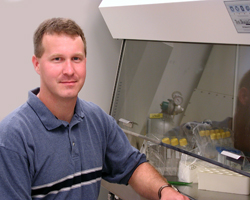 |
James Wahl, Ph.D. |
NOTE: This profile is part of a series highlighting the 26 researchers who were named UNMC Distinguished Scientists or New Investigators for 2007. Each of these researchers will be profiled in UNMC Today leading up to a March 20 ceremony to recognize their achievements.
- Name: James (Jim) Wahl, Ph.D.
- Title: Assistant professor in the College of Dentistry
- Joined UNMC: 2001
- Hometown: Toledo, Ohio
Briefly describe your research in laymen terms, please.
We study how epithelial (skin) cells adhere to one another and how cell adhesion is disrupted during cancer progression. We also are interested in how normal skin cells interact with one another and form the protective barrier.
What led you to pursue this area of research?
It is amazing to me that some thing as simple as two cells “sticking” to one another can influence so many basic functions and when it is disrupted lead to so many problems.
How do you see your research contributing to science?
There are many aspects of cell adhesion we still don’t understand. We are doing our best fill in the details and understand how cell junctions are put together at the molecular level. We are adding one piece at a time.
Why did you become a scientist?
It was an accident. At 18 years old I planned on being a professional bicycle racer. I decided to enroll in college to occupy my time before the racing season began. Once I finished my science courses my first semester, I never went back to the professional circuit. When I finished my undergraduate degree, I was looking for any job I could use my biology degree and I was lucky enough to find a lab technician position. After working as a technician for a short time, I realized I wanted to learn how to develop and pursue my own ideas and experiments. I was lucky to be part of a fantastic lab as a graduate student and it helped convince me that I made the right decision.
What is your hope for the next generation of scientists?
I hope the next generation of scientists experiences a better funding climate to pursue their research and the resources will be available to conduct good science.
Beyond grant funding, how do you measure success?
On a daily basis, moving forward and making progress in the lab is how I judge success. It is often difficult to see the progress until you step back and look at things over time. I also like to see people graduate from the lab and continue on in their careers.
What would you tell a student interested in a research career?
This is not an easy career … but it’s very rewarding. If science is something you love, you have to pursue it. Be ready for a fair number of disappointments but the successes make it more than worthwhile. The feeling of following a set of experiments to a successful conclusion is the best feeling in the world. The failures can be satisfying, too, but usually only after other pieces of the puzzle become apparent.
Do you have a hero/role model? If so, what do you admire most about them?
My heroes are my graduate advisers that agreed to take me in their lab and show me how to ask the “right” questions and how to be a scientist. I’m still learning from their example.
Tell us about your family and hobbies outside of the lab.
My wife (Valeta) and I have three busy children, Tyler, 14, Samantha, 13, and Justin, 10. Besides many school activities, we all enjoy riding our bikes along the trail system in Lincoln. We also enjoy camping when our busy schedules will allow it.
List three things few people know about you.
- I’ve raced BMX bicycles for 30 years;
- My wife and I are “high school sweethearts”; and
- I am a hopeless Detroit Tiger and Lions fan.